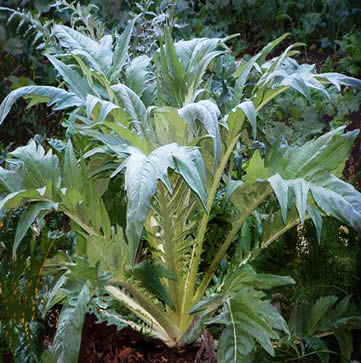Frequently Asked Questions: What About Perennials?
By Rachel Britten, Golden Rule Mini-Farm Manager

Cardoon produces large amounts of biomass for the compost pile.
PHOTO CREDIT: Bountiful Gardens Staff
Q: "A lot of what I've read about GROW BIOINTENSIVE seems focused on annual crops; do perennials have a place in the GROW BIOINTENSIVE method?"
A: It's true that a majority of our gardens are planted in intensive annual crops. Annual crops provide the benefit of producing a lot of food and biomass in a small amount of space as well as making food available for eating within a season. In addition to the fast and speedy annual, there is certainly a place for the many benefits provided by perennial plants in the GB method. In our method, perennials act as long-term food producers as well as productive contributors to our compost piles that don't require re-planting every year.
Cardoon (a relative of the artichoke) and alfalfa are both perennial crops that are often integrated into our garden bed rotations because of their ability to produce large amounts of plant material that we utilize in our compost piles. We cut back cardoon every fall. By early summer the next year the enormous plants have grown to over six feet tall! While alfalfa does not grow as tall, we can cut this traditional hay-crop five (and sometimes up to six!) times per year, which means its contribution to our compost piles is significant. Plus, because alfalfa is a perennial, its root system has time to grow more than 50 feet down, scavenging nutrients that other crops cannot reach in a single season. And, as an added bonus, alfalfa is a nitrogen fixer—it can take nitrogen from the air and bring it into the soil in a form eventually available to all plants, annuals and perennials—free fertilizer!
Perennials can also be valuable food-producers for our gardens. Because many perennials take a long time to actually bear fruit or nuts, we affectionately refer to them as a GROW BIOINTENSIVE farmer's retirement plan. We utilize perennial food crops as a complement to our intensive annual production. Filberts, also known as hazelnuts, can produce 15 pounds of nuts or more in just 100-square-feet. This calorie-dense, fat-rich nut allows us to reduce the pounds of food we need to eat in a day and get some healthy fat out of the garden!
Related topics in this issue:
Garden Tip: Care and Feeding of Tree Collards: another valuable perennial crop we love!
top | Newsletter Home |Table of Contents| Archive

|



